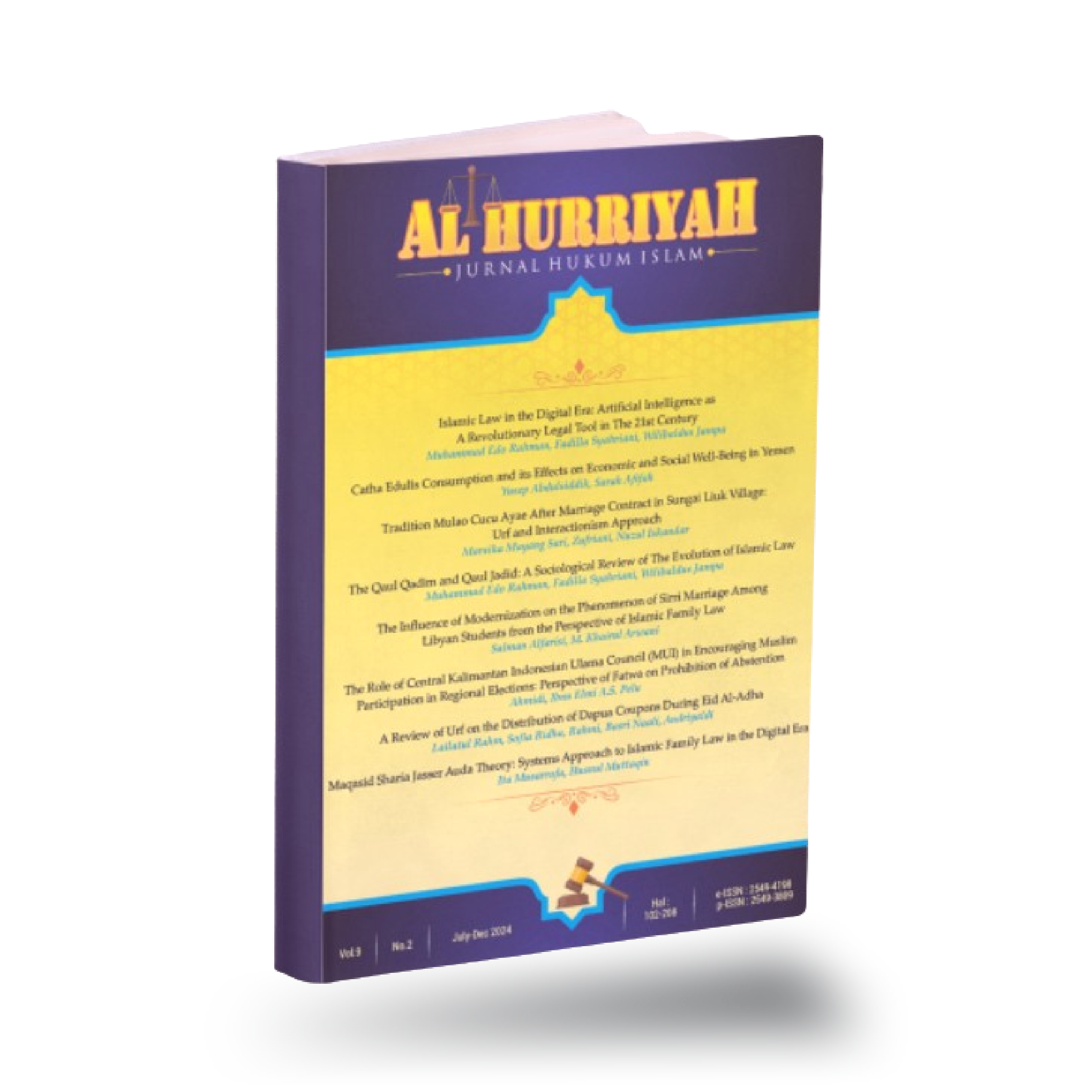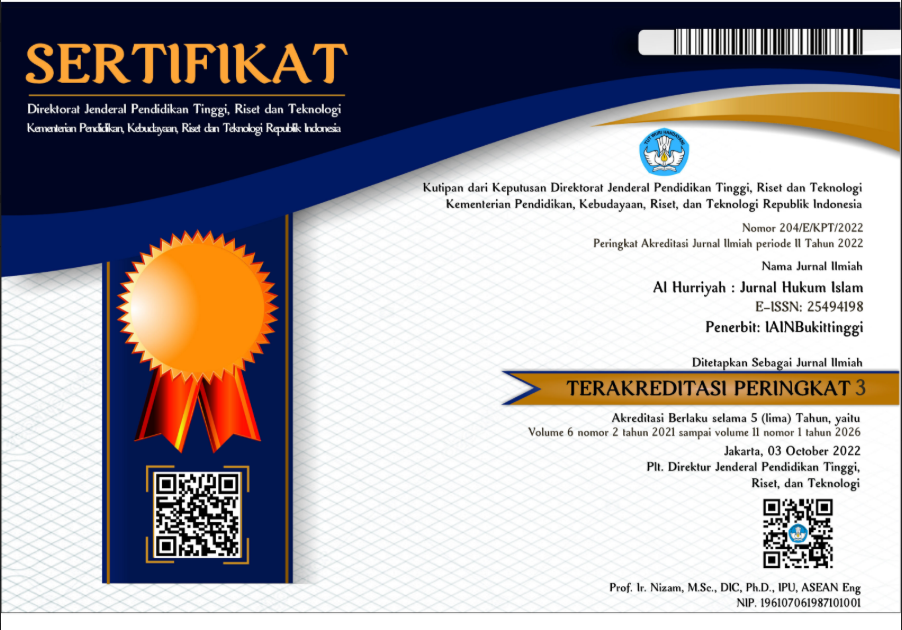A Review of Urf on the Distribution of Dapua Coupons During Eid Al-Adha
DOI:
https://doi.org/10.30983/al-hurriyah.v9i2.8075Keywords:
‘Urf, Kupon, Hari raya Idul AdhaAbstract
The background of this study is the difference the committee has been chosen as the divider of dapua coupons, will distribute the coupons in the afternoon on the day before the slaughter day, they distribute coupons from one house to another, but in the distribution of dapua coupons there are differences from one house to another, some are given 2 coupons in one family consisting of 3 people, There are 3 coupons in one family of 5 people and there are given 3 coupons in one family consisting of 7 people. When viewed in terms of habits or 'urf that usually apply in society in general, distributing qurban coupons is distributed equally. In this research method, the author conducted qualitatively, namely research carried out systematically by raising existing data in the field. Where researchers try to find information or sources that can be used as sources of research data at this writing is the head of the qurban, the committee that distributes coupons. To obtain data and material in this writing, the author immediately went to the field to get the desired data in the field by interviewing the source concerned. The results of the study concluded that the system used to distribute dapua coupons was carried out by calculating the number of families or based on KK (family cards), in terms of 'urf or custom is urf shahih, because it is in accordance with Islamic shari'a and brings fame to the community.
References
Books
Achjar, Komang Ayu Henny, Muhamad Rusliyadi, A Zaenurrosyid, Nini Apriani Rumata, Iin Nirwana, and Ayuliamita Abadi. Metode Penelitian Kualitatif: Panduan Praktis Untuk Analisis Data Kualitatif Dan Studi Kasus. PT. Sonpedia Publishing Indonesia, 2023.
Arikunto, Suharisma. Dasar-Dasar Research. Bandung: Tarsoto, 1995.
Azzahra, Sitti Aliyah, Aep Saefullah, Tohiroh Tohiroh, Farhat Abas, Tetty Nur Intan Rifia, Zulkifli
Khallaf, Abdul Wahab. Ilmu Ushul Fiqh. Jakarta: Dar al-Manar, 1973.
Mardani. Ushul Fiqh. Jakarta: Raja Grafindo Persada, 2013.
Sahroni, Oni, and Agus Setiawan. Qurban Kekinian. Jakarta: Inisiatif Zakat Indonesia, 2022.
Samsu. Metode Penelitian: Teori Dan Aplikasi Penelitian Kualitatif, Kuantitatif, Mixed Methods, Serta Research Dan Development. Jambi: Pustaka Jambi, 2017.
Journal
Bayu, Bias Tirta, Sri Mei Ulfani, Ratih Kumala Sari, Ibnu Majah, and Wismanto Wismanto. “Pengembangan Kemampuan Manusia Dalam Sudut Pandang Pendidikan Islam.” Journal of Creative Student Research 2, no. 2 (2024): 56–68.
Furqan, Muhammad, and Syahrial Syahrial. “Kedudukan ‘Urf Sebagai Sumber Hukum Dalam Mazhab Syafi’I.” Jurnal Al-Nadhair 1, no. 2 (2022): 68–118.
Hendri, Hendri, and Andriyaldi Andriyaldi. “PEMBERIAN UPAH PEMOTONGAN HEWAN QURBAN MENURUT HUKUM ISLAM (Studi Pada Masyarakat Tanjung Barulak Kab. Tanah Datar).” Al Hurriyah: Jurnal Hukum Islam 3, no. 2 (2018): 219–34.
Ismail, Ismail, Busyro Busyro, Nofiardi Nofiardi, Fajrul Wadi, and Hanif Aidhil Alwana. “The Contribution of ‘Urf to the Reform of Islamic Inheritance Law in Indonesia.” In Al-Risalah: Forum Kajian Hukum Dan Sosial Kemasyarakatan, 22:165–78, 2022.
Jampa, W. ., & Ramadhan Fitri, D. (2024). Legal Analysis of the Impact of Nusantara Capital Development on Environmental Damage. Hakamain: Journal of Sharia and Law Studies, 3(2), 104–116. https://doi.org/10.57255/hakamain.v3i2.340
Mas’ udi, Anas. “Berqurban, Pengertian, Pelaksanaan, Permasalahan Dan Solusinya; Perspektif Madzhab Syafiâ€TM I.” Jurnal Keislaman 6, no. 2 (2023): 491–504.
Mimbar, Asep Saiful. “Qurban as Social Worship from Hadith Perspective: Qualitative Study.” In Gunung Djati Conference Series, 4:884–89, 2021.
Noviandri, Raka, Elsita Insani, Latifha Umi Barakah, Sabila Ramadhani Lubis, and Wismanto Wismanto. “Qurban Sebagai Sarana Penguatan Nilai Nilai Kebersamaan Dalam Masyarakat.” Akhlak: Jurnal Pendidikan Agama Islam Dan Filsafat 2, no. 1 (2025): 98–109.
Nurazizah, Aliya, Tita Komariyatus Saadah, and Muchamad Rifki. “Memahami Peranan Hakikat Manusia Dalam Pandangan Islam.” BUHUN: Jurnal Multidisiplin Ilmu 2, no. 2 (2024).
Pratama, Syahrul, and M Syaikhul Arif. “Nilai-Nilai Qurban Dalam Perspektif Ibadah, Ekonomi, Dan Sosial.” Al-Mizan: Jurnal Ekonomi Syariah 7, no. I (2024): 43–53.
Safiq, Abdulloh, M Miftakhul Huda, and Abdul Khamid. “The Universal Value of Islam as Rahmatan Lil’Alamin.” Indonesian Journal of Islamic Religion and Culture 1, no. 1 (2024). https://doi.org/https://journal.iai-alfatimah.ac.id/index.php/ijirc/article/view/50.
Simanjuntak, Dahliati. “Faktor-Faktor Yang Mempengaruhi Kurangnya Kesadaran Masyarakat Dalam Berkurban.” Jurnal AL-MAQASID: Jurnal Ilmu Kesyariahan Dan Keperdataan 5, no. 2 (2019): 258–70.
Siregar, Idris, Ismi Aulia Palem, and Naini Anggreini. “Menguak Hikmah Di Balik Ibadah Qurban.” Semantik: Jurnal Riset Ilmu Pendidikan, Bahasa Dan Budaya 2, no. 3 (2024): 173–86.
Siregar, Rosnani, and Muhammad Arsad Nasution. “Ibadah Qurban Sebagai Momentum Peningkatan Ekonomi Umat Islam: Analisis Pendapatan Peternak Hewan Qurban Pada Hari Raya Idul Adha.” Liwaul Dakwah: Jurnal Kajian Dakwah Dan Masyarakat Islam 14, no. 1 (2024): 1–13.
Sugiyarti, Sri, and Kasori Mujahid. “Harmoni Dan Toleransi: Menyelami Hubungan Antar Agama Dalam Perspektif Pandangan Dunia Islam.” TSAQOFAH 4, no. 1 (2024): 663–72.
Wandi, Sulfan Wandi Sulfan. “Eksistensi’Urf Dan Adat Kebiasaan Sebagai Dalil Fiqh.” Samarah: Jurnal Hukum Keluarga Dan Hukum Islam 2, no. 1 (2018): 181–96.
Zainuddin, Idrisi Raliya Putra, Nurhayati Nurhayati, Rahman Nurhakim, and Syarif Hidayatullah. “Pemberdayaan Masyarakat Dalam Pengelolaan Hewan Kurban Yang Halal Dan Baik Di Masjid Baiturrahman.” Journal of Community Research & Engagement 1, no. 1 (2024): 1–10.
Interview
Bulkis. “Interview.” Galuang, 2023.
Jefri. “Interview.” Galuang, 2023.
Mudo, Wardi Malin. “Interview.” Galuang, 2023.
Parta, Ayub. “Interview.” Galuang, 2023.
Downloads
Published
How to Cite
Issue
Section
Citation Check
License
Copyright (c) 2025 Lailatul Rahmi, Sofia Ridha

This work is licensed under a Creative Commons Attribution-ShareAlike 4.0 International License.
Authors who publish with this journal agree to the following terms:
- Authors retain copyright and grant the journal right of first publication with the work simultaneously licensed under a Creative Commons Attribution-ShareAlike 4.0 International License that allows others to share the work with an acknowledgment of the work's authorship and initial publication in this journal.
- Authors are able to enter into separate, additional contractual arrangements for the non-exclusive distribution of the journal's published version of the work (e.g., post it to an institutional repository or publish it in a book), with an acknowledgment of its initial publication in this journal.
- Authors are permitted and encouraged to post their work online (e.g., in institutional repositories or on their website) prior to and during the submission process, as it can lead to productive exchanges, as well as earlier and greater citation of published work (See The Effect of Open Access).





